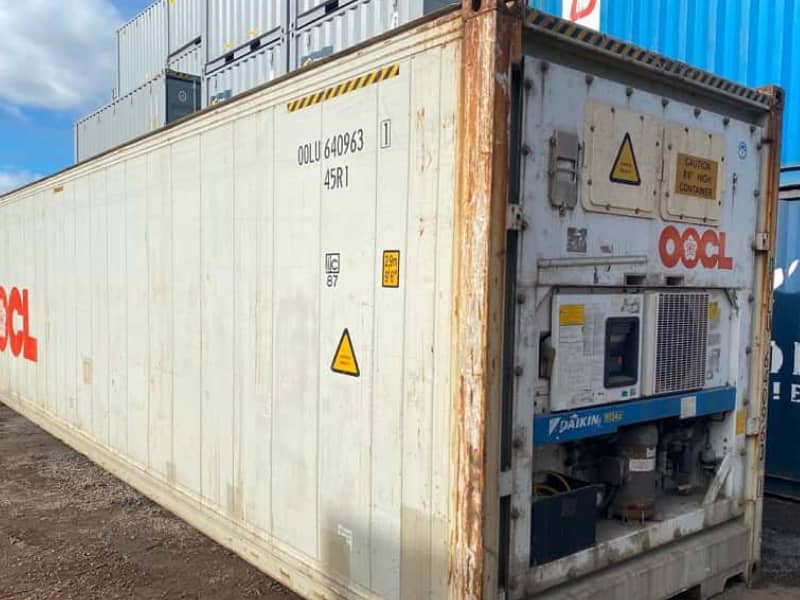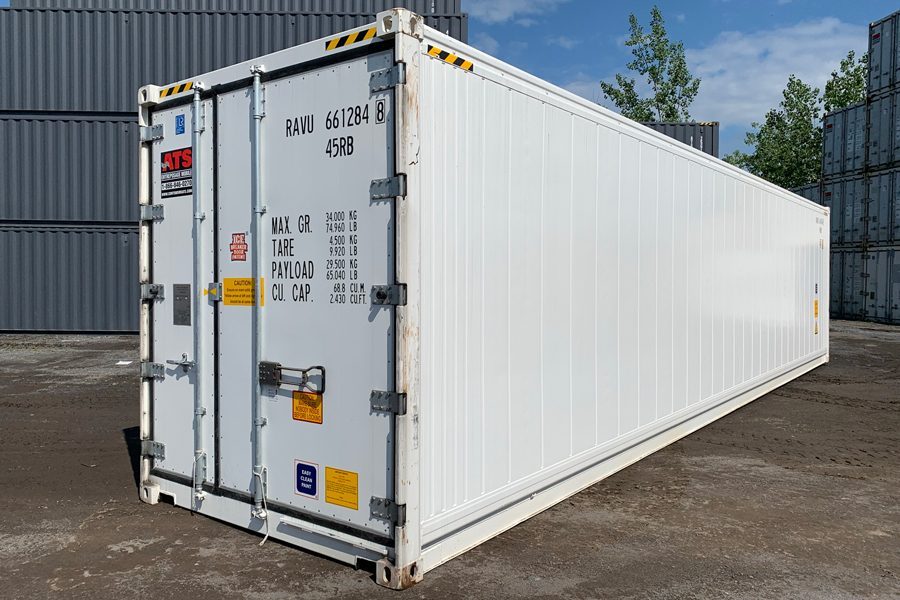Everything About Freezer Containers: Crucial Insights for Your Storage Space Needs
Freezer containers play a crucial function in the preservation of perishable goods. They can be found in various types, consisting of refrigerated and insulated systems, each made for details storage demands. Understanding the advantages and essential attributes of these containers is important for organizations intending to optimize their procedures. As the need for efficient storage space services expands, checking out the various options readily available can result in educated decisions that influence both productivity and sustainability. What aspects should one think about when choosing the best container?
Sorts Of Cold Store Containers
Freezer containers can be found in various kinds, each designed to meet particular temperature level control needs. Amongst one of the most typical kinds are chilled containers, which preserve temperatures between 0 ° C to 10 ° C, making them appropriate for subject to spoiling items like fruits, vegetables, and dairy items. An additional type is the deep freezer container, which operates at temperature levels below -18 ° C, suitable for long-term storage space of icy products such as meats and seafood.
Protected containers provide temperature security without active air conditioning, making them beneficial for short-term transportation of temperature-sensitive products. Furthermore, there are portable freezer units, which provide adaptability in locations and are often made use of in occasions or seasonal procedures. Blast chillers swiftly reduce the temperature level of warm foods, making sure safety and security and top quality. Each type serves a special purpose in various markets, from food service to pharmaceuticals, stressing the relevance of choosing the appropriate container for specific storage space demands.

Benefits of Making Use Of Cold Storage Solutions

Moreover, chilly storage space options expand the service life of items, lowering waste and enhancing success for businesses. By successfully taking care of supply with proper temperature level control, companies can optimize their supply chains and enhance functional performance.
Furthermore, freezer facilities permit versatile storage options, accommodating different volume needs and seasonal fluctuations in demand (used 40ft refrigerated shipping containers). This versatility aids businesses respond rapidly to market modifications
Employing cool storage space remedies can guarantee compliance with health and safety and security regulations, protecting both consumers and companies. In general, the critical use chilly storage space improves product management while advertising sustainability and financial stability.
Key Features to Seek in Freezer Containers
When selecting chilly storage containers, a number of essential functions advantage mindful factor to consider to secure peak performance and reliability. Temperature level control capabilities are necessary; containers must maintain regular temperature levels suitable for particular goods. Insulation quality also plays a substantial role, as premium insulation lowers energy intake and boosts temperature level security.
Next, ease of gain access to and loading is important; containers must provide user-friendly layouts for reliable handling and organization. Longevity is an additional important element; weather-resistant products guarantee durability and protect components versus ecological elements.
Additionally, movement features, such as built-in wheels or raising factors, help with transportation, while adjustable formats permit tailored storage space services.
Last but not least, keeping an eye on systems, including temperature alarm systems and remote monitoring, give real-time updates, ensuring that conditions remain perfect. By concentrating on these features, customers can pick cold store containers that meet their functional demands efficiently.
Picking the Right Cold Storage Container for Your Requirements
Choosing the best cold store container calls for a thoughtful assessment of operational requirements and certain needs. Factors such as the sort of items being stored, temperature sensitivity, and volume needs to be prioritized. Subject to spoiling food things may require containers with rigorous temperature level controls, while drugs might require accurate problems to keep efficiency.
Furthermore, prospective individuals should think about the container's dimension and mobility. A bigger device might be required for mass storage, while smaller, portable alternatives can be optimal for temporary or on-site demands. Insulation quality and energy performance are additionally important, as these will certainly influence operational costs and temperature stability.
Compliance with industry guidelines and requirements is important, specifically in industries like food and healthcare. By carefully evaluating these facets, individuals can select a cold storage container that successfully fulfills their distinct demands and guarantees optimum storage problems.
Finest Practices for Maintaining Freezer Issues
Keeping optimal cold store conditions is necessary for preserving the top quality and safety and security of temperature-sensitive items. Consistently keeping track of temperature and humidity levels is vital; using dependable electronic thermometers and hygrometers can supply accurate analyses. Appropriate insulation of chilly storage space containers assists reduce temperature level fluctuations and power loss.
Implementing a first-in, first-out (FIFO) system ensures that older stock is utilized prior to newer stock, decreasing waste (used 40ft refrigerated shipping containers). Additionally, keeping an arranged format within the storage room permits far better air movement and decreases the danger of cross-contamination
Regular maintenance checks on devices, such as seals and compressors, are necessary to prevent malfunctions. Team training on ideal methods Find Out More for filling and unloading items helps keep temperature level honesty. Finally, maintaining doors shut as much as feasible limitations warm exchange, guaranteeing that the freezer atmosphere remains effective and secure in maintaining important products.
Price Considerations for Cold Storage Space Solutions
When assessing cool storage space remedies, it is vital to consider the first investment expenses together with ongoing operational costs. An extensive break down of these prices can expose considerable lasting cost savings potential for companies. Recognizing these financial aspects helps stakeholders make informed choices regarding their cold store demands.

First Investment Costs
The monetary landscape of cold store containers provides various first investment prices that services should take into consideration. These costs generally consist of the purchase or rental price of the containers, which can differ based on type, insulation, and size high quality. Furthermore, expenses connected to retrofitting existing structures to suit freezer should be factored in, especially if specialized tools is required. Installation prices, consisting of electric work and refrigeration systems, likewise add to the overall first investment. Businesses need to not ignore transport expenses for supplying containers to their wanted area. Ultimately, prospective personalization options, such as shelving or temperature tracking systems, can further impact the initial monetary expense. Mindful budgeting for these aspects is vital for effective cold store application.
Operational Expenditures Break Down
Operational expenses for cold storage space services include numerous critical cost considerations that organizations need to navigate. Key aspects consist of energy costs, which can be substantial because of the requirement to maintain reduced temperature levels. Upkeep expenditures are also substantial, as normal servicing is important to guarantee devices operates effectively and stays certified with health and wellness standards. In addition, labor costs might develop from the demand for specialized personnel to monitor the storage and manage atmosphere. Insurance policy expenditures are another consideration, as business must secure their financial investments versus possible losses. Any prospective regulative conformity costs have to be factored in, as services may require to spend in systems that stick to food security and ecological navigate to these guys laws. Recognizing these costs is critical for effective budgeting.
Long-Term Cost Savings Possible
Purchasing freezer solutions uses considerable long-term financial savings potential, transforming first expenses into economic effectiveness with time. By minimizing perishing and waste, businesses can improve their profit margins substantially. Advanced insulation and energy-efficient systems decrease utility costs, which accumulate over the life-span of the devices. Cool storage containers often call for much less regular maintenance contrasted to typical refrigeration methods, leading to reduced repair service expenses. The capability to store products for extensive durations without compromising top quality allows businesses to exploit on market fluctuations, maximizing revenue. In addition, the scalability of freezer services makes it possible for business to adjust to altering needs without incurring excessive expenses. Generally, these variables add to a compelling instance for freezer as an affordable financial investment strategy.
Often Asked Concerns
The Length Of Time Can Food Be Kept in Cold Storage Containers?
The period food can be stored in freezer containers differs by type. Generally, perishable items last from days to weeks, while icy foods can stay safe for months, depending upon appropriate temperature level and storage space conditions.
Are Freezer Containers Energy-saving?
The power effectiveness of cold store containers varies based upon layout and insulation high quality. Modern systems usually make use of innovative technology to minimize energy usage, eventually contributing to index decreased operational costs and environmental impact in long-term use.
Can Cold Storage Containers Be Customized for Specific Needs?
Cold storage containers can undoubtedly be personalized to fulfill details needs. Modifications may include temperature controls, dimension adjustments, and added features, enabling customers to tailor solutions properly for various storage space demands and operational choices.
What Are the Usual Dimensions of Cold Store Containers?
Cold storage space containers generally are available in conventional sizes such as 10, 20, and 40 feet. These measurements fit various storage space requirements, guaranteeing versatility for companies needing temperature-controlled settings for sensitive products or disposable goods.
Do Cold Storage Containers Require Unique Authorizations for Use?
Freezer containers often require unique authorizations for use, depending on neighborhood policies and intended applications. Authorities may mandate permits to assure safety and security requirements, ecological compliance, and proper functional methods are preserved during their use.
Cold storage containers come in various types, each designed to meet certain temperature level control needs. Additionally, chilly storage centers allow for versatile storage space options, suiting various volume demands and seasonal fluctuations in demand. Picking the right chilly storage space container requires a thoughtful evaluation of operational demands and certain demands. The financial landscape of cool storage space containers presents different initial investment prices that organizations should consider. Cold storage space containers can certainly be customized to fulfill certain needs.